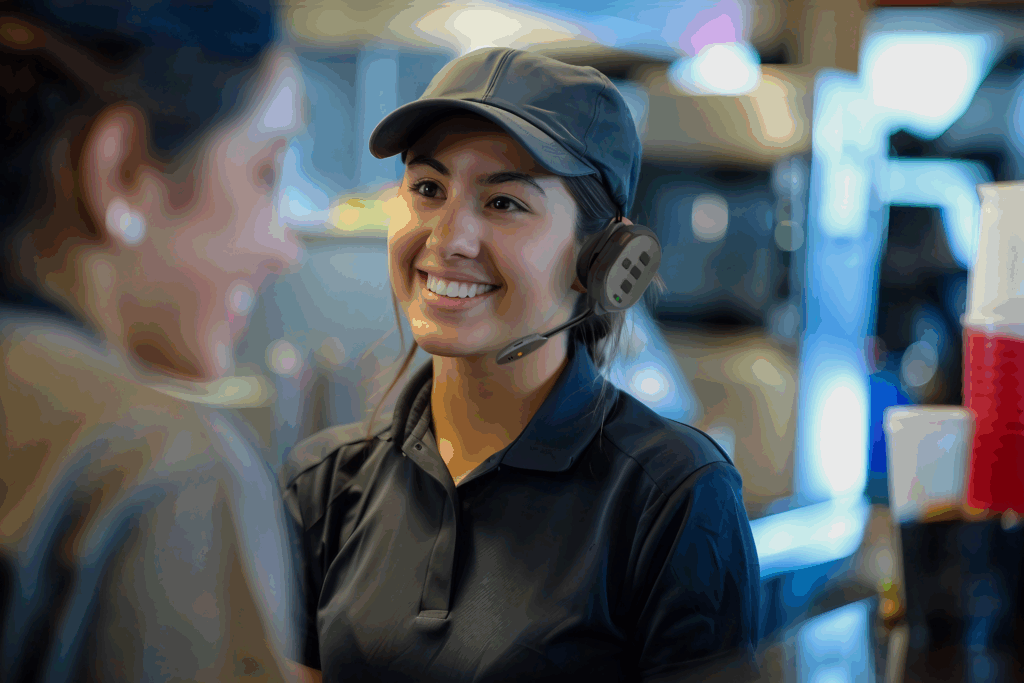Quick Service Restaurants (“QSRs”) are a cornerstone of the food industry, especially in the United States, where convenience and speed are paramount. Drive-thrus are a significant part of QSR operations, accounting for a substantial portion of their revenue. However, adverse weather conditions can disrupt these operations, leading to significant financial losses.
The Impact of Adverse Weather on QSR Operations
Financial Losses
Drive-thrus contribute significantly to the revenue of QSRs. According to a report by QSR Magazine, drive-thrus accounted for nearly 70% of sales for many fast-food chains in 2020. When adverse weather strikes, these critical revenue streams are disrupted.
- Revenue Statistics: On average, a single QSR drive-thru can generate around $2,000 to $4,000 in sales per day. If a drive-thru is shut down for just one day due to bad weather causing the dedicated drive-thru communication system to fail, the financial loss can range from $2,000 to $4,000 per restaurant location.
- Annual Impact: If adverse weather leads to drive-thru shutdowns for an average of five days per year, a single drive-thru location could lose between $10,000 and $20,000 annually. For a chain with 100 locations, this translates to $1 million to $2 million in lost revenue per year.
Customer Satisfaction and Loyalty
Adverse weather not only impacts immediate sales but also affects customer satisfaction and loyalty. When customers face inconvenience due to closed drive-thrus, their overall experience with the brand diminishes. A survey by Market Force Information found that 60% of consumers would switch to a competitor if they faced poor service or inconvenience at their preferred QSR.
The Solution: Portable Backup Emergency Drive-Thru Systems
Minimizing Downtime
Portable backup drive-thru systems are crucial for mitigating the impact of adverse weather. These emergency 911 systems can be quickly deployed to ensure that drive-thru operations continue seamlessly, even when primary systems are down.
- Rapid Deployment: Portable drive-thru systems can be set up within minutes, reducing downtime significantly. This ensures that even during unexpected weather events, the QSR can continue to serve customers and generate revenue.
- Cost-Effectiveness: Investing in a portable backup system is cost-effective compared to the potential losses incurred during drive-thru shutdowns. QSRs can protect themselves against losses that can far exceed the initial investment.
- Portability: The backup drive-thru systems are conveniently packaged for ease of portability, and can be simply moved from store-to-store as needed.
Enhancing Customer Experience
Ensuring continuous operation during adverse weather conditions enhances customer experience and loyalty. Customers appreciate the reliability and convenience of a QSR that can serve them regardless of weather conditions.
- Customer Retention: By providing consistent service, QSRs can retain their customer base and prevent them from turning to competitors. A study by Bain & Company found that increasing customer retention rates by 5% can increase profits by 25% to 95%.
- Brand Reputation: Maintaining operations during adverse weather enhances the brand’s reputation for reliability and customer service, leading to positive word-of-mouth and increased customer loyalty.
Adverse weather conditions pose a significant threat to QSR drive-thru operations, leading to substantial financial losses and decreased customer satisfaction. Investing in portable backup drive-thru systems is a proactive solution that ensures continuous operation, minimizes downtime, and enhances customer experience.
By leveraging these systems, QSRs can protect their revenue streams, retain customers, and maintain a strong brand reputation, ultimately driving long-term success.



